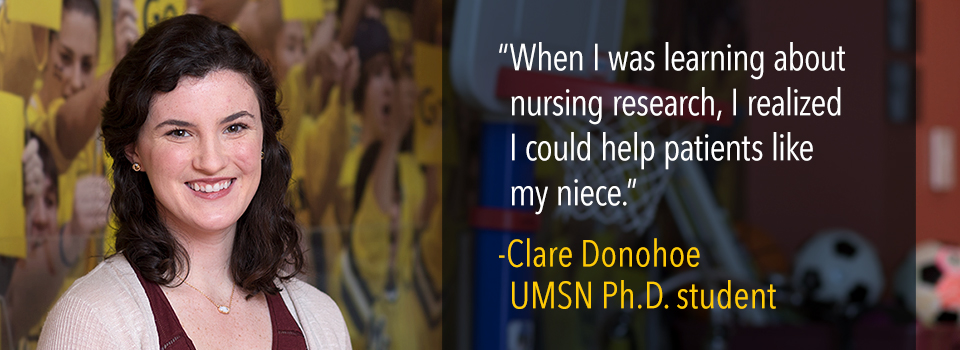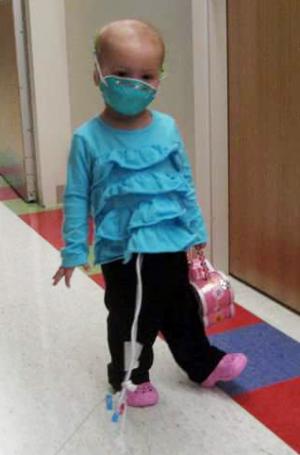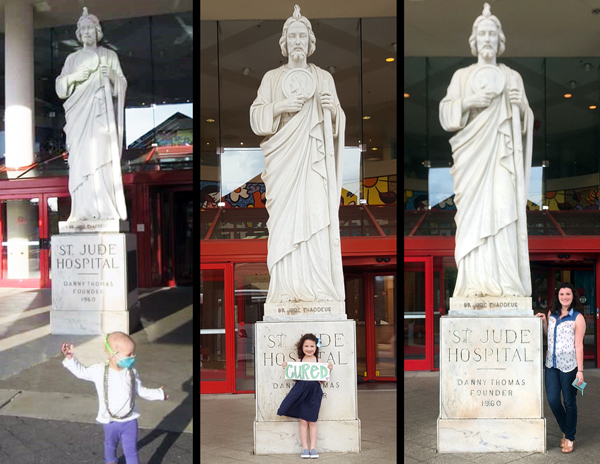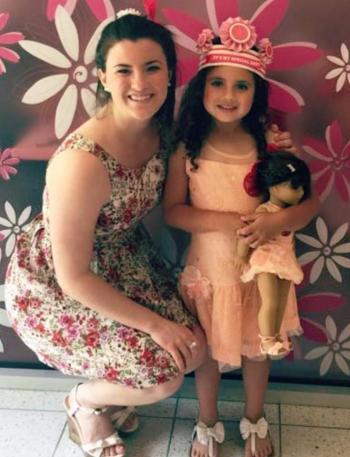Student spotlight: A grave diagnosis in the family and unanswered questions inspire research focus

Clare Donohoe was 16 years old when her young niece, Leah, was diagnosed with a rare subtype of acute myeloid leukemia. Leah went through months of treatment at a hospital in Washington, D.C., but still needed a bone marrow transplant. Unfortunately, there wasn’t a match in the family or on the national registry. Leah's care team told the family there weren't many promising options beyond waiting for a match.
 “My sister was not taking that for an answer,” said Donohoe. “She started looking for other options and found a clinical trial at St. Jude Children’s Research Hospital. It was a new, risky trial using parents who weren’t full matches as donors. There wasn’t a ton of success, but they felt it was the better option.”
“My sister was not taking that for an answer,” said Donohoe. “She started looking for other options and found a clinical trial at St. Jude Children’s Research Hospital. It was a new, risky trial using parents who weren’t full matches as donors. There wasn’t a ton of success, but they felt it was the better option.”
The family packed up and headed to St. Jude’s in Tennessee. The risk proved to be one worth taking because it worked for Leah.
Donohoe saw the role of nurses in Leah’s care and decided to pursue a career in nursing, but she had a lot of questions.
“Research was the thing that gave my niece a second chance,” she said. “But at the time, I didn’t understand why one hospital could do the trial but the other hospital couldn’t.”
An uneasy start
In her early days of the University of Michigan School of Nursing’s (UMSN) undergraduate program, which has a significant clinical practice focus, Donohoe was apprehensive.
“I wasn’t fitting in well in the bedside realm,” she said. “I wasn’t sure it was for me. I wanted to know more about why that patient got that diagnosis or why we were doing things a certain way. I always wanted to go more in-depth.”
Then Donohoe learned of UMSN’s Hillman Scholars Program in Nursing Innovation. It puts research-focused nursing students on an accelerated path to their Ph.Ds. with the goal of increasing their research trajectory and impact.
“It felt like everything was coming full circle,” said Donohoe. “When I was learning about nursing research, I realized I could help patients like my niece.”
Donohoe had found her place.
Research for Leah

After Donohoe’s junior year, she had a research internship at St. Jude’s where Leah received her treatment. Donohoe was the only nursing student in a group of more than 60 students from across the country. She picked a project in honor of Leah.
“One of Leah’s side effects from treatment was mucositis (mouth sores/inflammation),” she explained. “She would just eat butter packets because she needed to get calories but eating anything was painful.”
Donohoe’s retrospective review of bone marrow transplant patients who developed mucositis earned her a second place award from the program. The experience solidified her decision to focus on nursing research.
“I loved it every day,” she said. “I felt like I was making a difference and that I could do something to help a patient who might otherwise be told there’s nothing that can be done.”
Practice inspiring research
During Donohoe’s last clinical rotation as an undergraduate student, she cared for patients with sickle cell disease (SCD). It’s a red blood cell disorder in which sickle-shaped cells create blockages that prevent oxygen from reaching tissue. The lack of tissue oxygen can cause sudden, severe pain and lead to organ damage.
 “Several of the patients had pain that was uncontrollable,” said Donohoe. “There’s concern in pain management because of today’s opioid epidemic but I felt like some of the sickle cell patients were treated differently. I had conversations with one patient that made me sad because I felt like he knew people thought he was a drug seeker. As nurses, we’re taught to be an advocate for the patient but the line was blurred with opioids. It impacted our ability to give him the best care.”
“Several of the patients had pain that was uncontrollable,” said Donohoe. “There’s concern in pain management because of today’s opioid epidemic but I felt like some of the sickle cell patients were treated differently. I had conversations with one patient that made me sad because I felt like he knew people thought he was a drug seeker. As nurses, we’re taught to be an advocate for the patient but the line was blurred with opioids. It impacted our ability to give him the best care.”
The experience stuck with Donohoe. In 2017, as she transitioned to the Ph.D. portion of her education, Donohoe was selected as a trainee in a UMSN/National Institute of Nursing Research grant, Complexity: Innovations in Promoting Health and Safety.
 “When it was time to pick a research topic, my mentor asked if I’d seen anything that made me question how or why we are doing something,” she said. “Immediately, that patient came to mind.”
“When it was time to pick a research topic, my mentor asked if I’d seen anything that made me question how or why we are doing something,” she said. “Immediately, that patient came to mind.”
Donohoe is now in the early stages of a research project investigating predictors of pain such as age, sex, and mental health characteristics to develop a better understanding of which sickle cell patients are most likely to be hospitalized for pain.
“If we can understand which patients are more likely to have pain, we can target those patients to prevent the pain and reduce how often and how long they are hospitalized,” said Donohoe.
Donohoe says even though her project is not her original focus, she’s open to future opportunities in pediatric oncology research. She only has to look at her own family to see the impact.
“Leah’s doing great now,” said Donohoe. “She’s almost nine and if you look at her today you would never know she had cancer. It’s really powerful to know that’s because of research and I hope I can make the same difference for patients someday.”





